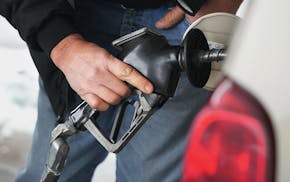Opinion editor's note: Strib Voices publishes a mix of material from 11 contributing columnists, along with other commentary online and in print each day. To contribute, click here.
•••
Minnesota stands at the start of a historic new chapter with adult-use cannabis legalization. But as the state builds its legal market, we must be honest about what threatens its success: not just illegal growers or shady dealers — but our own tax policy.
Gov. Tim Walz and legislative leaders have included a proposal to raise Minnesota's cannabis tax from 10% to 15% in the recent budget agreement. This proposed tax increase will now be debated and decided during the upcoming special session. While the desire to address fiscal gaps is understandable, this move risks undercutting the very foundation of the legal cannabis market before it's even up and running.
What's often overlooked is that this cannabis tax doesn't stand alone. It stacks on top of existing state and local sales taxes, which vary by location. In places like St. Paul, where the combined sales tax rate is 9.875%, the total tax burden on cannabis purchases could rise to nearly 25% if the proposed hike is enacted. That's a steep premium compared to the illicit market, where unregulated sellers charge no taxes at all.
If we raise cannabis taxes too high, too early, we'll breathe life into the very black market legalization was meant to replace.
This isn't just theoretical. We've seen it play out in California where high taxes and heavy regulations have kept the illegal market thriving long after legalization. Despite being one of the first states to legalize cannabis, nearly two-thirds of California's cannabis sales still occur outside licensed channels. Why? Because for many consumers, the price difference is simply too big to ignore.
Let's look at how Minnesota compares. Our current cannabis sales tax — on top of the general sales tax — puts us roughly in the middle of the pack of other states. We're still below California, where combined state, local and cannabis taxes can exceed 35%, and Washington, which levies a staggering 37% excise tax and has an active black market as a result. Illinois, which taxes cannabis at 10% to 25% depending on THC content, has also struggled to fully transition consumers to the legal market.
Michigan, by contrast, has kept its cannabis tax steady at 10% and has seen strong legal market growth and a consistent decline in illicit sales. Their example shows that moderation works — and that a reasonable tax rate can still generate meaningful long-term revenue while supporting a viable legal marketplace.
Canada's experience is also instructive. At the time of legalization in 2018, Canada imposed high federal and provincial taxes that drove up legal prices. Licensed retailers initially struggled to compete with street dealers. Over time, Canada made smart adjustments, simplifying taxes and reducing wholesale markups. Today, more than 70% of cannabis sales in Canada occur through legal channels and the illicit market has steadily shrunk.
Minnesota should take note. Increasing cannabis taxes to 15% — a 50% hike — just as retail stores are preparing to open risks repeating the mistakes made elsewhere. Instead of guiding consumers into a safe, tested and legal system, we risk pushing them back underground.
Legal cannabis operators already incur costs illegal sellers don't — licensing fees, lab testing, wholesalers, child-resistant packaging, security measures and strict tracking requirements. Raising taxes further widens the price gap, making it even harder for licensed operators to compete. Some small businesses, especially social equity entrepreneurs, may throw in the towel before they ever have a chance to thrive.
With a flourishing illicit market and smaller-than-expected legal market, tax revenue would also likely fall short of projections.
Walz's concern about balancing the state budget is valid, but using cannabis taxes as a quick fiscal fix is not the right solution. This industry is still in its infancy. It needs time to stabilize, earn consumer trust and grow organically. A higher tax now will slow its progress and threaten its survival.
Minnesota doesn't need to squeeze cannabis to find additional state revenue. There are better ways to close budget gaps that don't compromise Minnesota's promise of a fair and inclusive cannabis industry. If Minnesota nurtures a competitive legal cannabis market — with reasonable taxes, consumer trust and broad access — the tax revenue will follow, growing through increased volume rather than inflated rates. This is the model for long-term success.
Equally important, we must support legal operators — especially those from communities disproportionately harmed by past enforcement. These entrepreneurs need real access to capital, transparent licensing processes and fair regulations. They cannot succeed in an overtaxed, undersupported system.
Tax policy is about more than dollars — it's about behavior. If Minnesota wants a strong, safe and sustainable cannabis market, it must build consumer trust. That means making legal products affordable, accessible and competitive with what people already buy.
We cannot simply legislate consumer loyalty. We must earn it — by giving people good products at fair prices in a system that feels easy to use and safe to support. Higher taxes may offer short-term gains, but they risk long-term erosion of that trust and participation.
This is a pivotal moment. Legislators should resist the urge to treat cannabis as a budget Band-Aid. If we push consumers and small businesses back into the shadows, we'll all pay the price.
This is our chance to learn from the mistakes of others. If we want the legal cannabis market to thrive, we must give it a fighting chance.
Opinion: 'TACO' is the secret to Trump's resilience
Morris: State workers return, St. Paul stirs — but will it stick?

Opinion: Your summer driving in the E15 era
!["As part of the [Nanaimo Infusion] celebration, the Americans and Canadians had our “family photo” taken together. When the photographer asked the](https://arc.stimg.co/startribunemedia/WUVW6K5HZVGM5KYP3QT4XPJZSI.jpg?h=91&w=145&fit=crop&bg=999&crop=faces)
